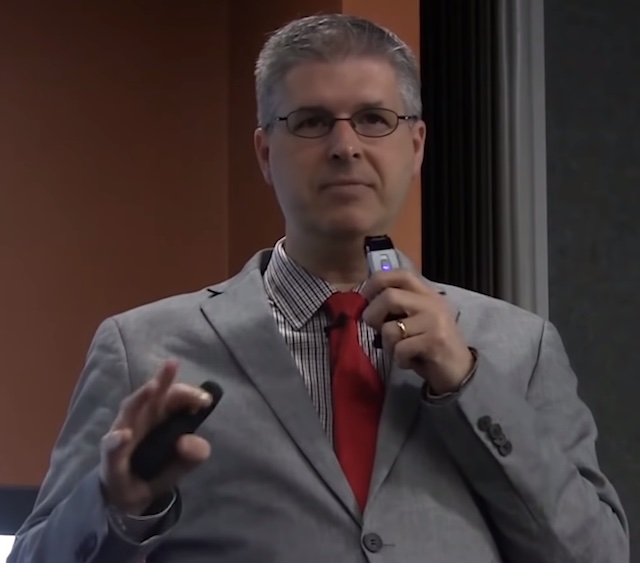The Antiplanner disagrees with Charles Marohn, of Strong Towns fame, about a lot of things. But I agree with him that the Minnesota Board of AELSLAGID (that’s Architecture, Engineering, Land Surveying, Landscape Architecture, Geoscience and Interior Design, in case it isn’t obvious) was wrong to fine him $1,500 and censure him for being late in renewing his license as a professional engineer.
Charles Marohn in 2016. Photo by SEAGreenways.
Marohn is trained as a professional engineer and started practicing, with a Minnesota license, in 2000. Though he stopped practicing in 2012 to form Strong Towns, he kept his license up and continued to call himself an engineer on his resume. However, he moved his residence in 2018 and forgot to notify AELSLAGID, so when they sent him a renewal notice he didn’t get it. He eventually renewed, paying a $120 late fee.
A South Dakota engineer named David Dixon, who apparently disagrees with Marohn about traffic engineering issues, found out that Marohn was briefly unregistered and filed a complaint because Marohn continued to call himself an engineer during the period when he was unlicensed. Marohn initially thought that AELSLAGID would dismiss it because he had registered, if late, but instead it decided to fine him the maximum amount.
I must confess some sympathy because the California timber industry once tried to intimidate me by claiming that I was practicing forestry without a professional license. The state licensed foresters so that small woodland owners could find credible advice on how to manage their lands. I wasn’t practicing forestry; I was merely writing comments on Forest Service plans and environmental impact statements.
I was far better qualified to write those comments and, to the distress of the timber industry, had far more influence on the Forest Service than any California licensed professional forester. Unlike Marohn, I never claimed to be a licensed professional forester, just that I had a degree in forestry. But the industry’s action was clearly in response to my analyses, not to my credentials.
I might sympathize with Dixon’s disagreements with Marohn about technical issues, but such debates should be held in public forums such as city councils and state legislatures, not before state licensing boards, which mainly exist to maintain professional oligopolies. Someone gets to be a professional engineer through training and experience, not by having a license.
If a property owner hired an unlicensed professional engineer to design a complicated structure, the city or county in which they lived would probably reject their application for a building permit. But if someone asked Marohn to testify before a city council or make a presentation to the public, it is up to the council or the general public to decide how credible Marohn’s credentials are, not a licensing board.
As Marohn says, this a really a free speech issue because the licensing board is attempting to punish him for having different opinions (though I have to admit that many other engineers agree with him). He paid his late fee so he shouldn’t have to pay any more. I suggest that the Minnesota state legislature censure AELSLAGID or even do away with it completely for embarrassing the state by letting politics interfere with its licensing duties.
The good news is that no state has yet proposed to license antiplanners. If one did, it is likely that only one person in the country would qualify for a license, and I wouldn’t apply.









Not a fan of these boards.
But let’s not propagate yet another Chucklie. He wasn’t late. There was a multi year gap.
He wasn’t late…he sat on it for years……. late is like a day ir week……
I likewise disagree with many of the statements/theories asserted by Marohn but that is a different issue from these obnoxious state licensing board.
In Texas, the P.E. board for years imposed requirements they weren’t allowed to impose. So much for all the applicants ripped off by paying fees and wrongfully being rejected. It routinely would and still does demand answers to questions outside its realm of regulation (“did you get a traffic ticket?”). It couldn’t punish for the answer unless it was wrong. Why is it collecting such information to begin with? For many, many years it imposed an additional fee it wasn’t authorized to charge in the amount of $200 (?) on top of the fees it could charge licensees for renewals.
The board also has an “inactive” option where you pay a fee for “inactive” status. Also if you had your license lapse, you would have to pay for every year missed in order to reinstate. This happens more frequently to licensees who are not actively practicing. What is the purpose of these “missing year payments” other than to retroactively reinstate for the previously omitted years?